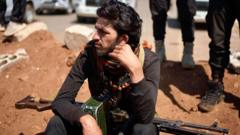Contention brews in Syria as the newly formed Committee for Civil Peace, aimed at fostering unity post-civil war, faces backlash from anti-regime supporters. Critics demand justice against former regime members.
**Syria's Committee for Civil Peace: A Source of Division Amid Attempts at Unification**

**Syria's Committee for Civil Peace: A Source of Division Amid Attempts at Unification**
Syria's new governance faces backlash from supporters of the civil uprising as a peace committee releases former regime soldiers, igniting public outrage.
The echoes of Syria's civil war continue as the government attempts to establish peace through the newly created Committee for Civil Peace. However, instead of uniting the country, this initiative has led to heightened tensions among those who previously supported the uprising against the regime of ousted president Bashar al-Assad.
Founded by the transitional administration, the committee's goal was to promote stability in a landscape still scarred by the conflict that has divided communities for around 14 years. Yet, its recent decisions have sparked dissatisfaction from many Syrians who had once rallied against Assad. Critics argue that in attempting to facilitate national healing, the Committee is neglecting the call for accountability for war crimes committed during the long-standing regime.
The situation reached a boiling point during the Muslim holiday of Eid al-Adha, when the committee controversially granted amnesty to numerous former regime soldiers, asserting that they bore no criminal responsibility. This announcement incited protests among activists who had envisioned a future where justice would be served for the atrocities they endured.
"People expected that after Assad's fall, there would finally be a reckoning for those who perpetrated war crimes," lamented Rami Abdelhaq, an activist advocating for transitional justice. "Instead, we witnessed a release of individuals who many believe should be held accountable for their actions."
The committee was formed in response to violent incidents where armed supporters of the ousted regime retaliated against Alawite minorities, a sect that previously held power under Assad. In the context of a fraught political climate, some Alawites faced violent retribution for their alignment with the old regime, exacerbating tensions and fears within communities.
As public dissent mounts over the committee’s decisions, the ability of Syria's fledgling government to bring about genuine reconciliation remains in question.
Founded by the transitional administration, the committee's goal was to promote stability in a landscape still scarred by the conflict that has divided communities for around 14 years. Yet, its recent decisions have sparked dissatisfaction from many Syrians who had once rallied against Assad. Critics argue that in attempting to facilitate national healing, the Committee is neglecting the call for accountability for war crimes committed during the long-standing regime.
The situation reached a boiling point during the Muslim holiday of Eid al-Adha, when the committee controversially granted amnesty to numerous former regime soldiers, asserting that they bore no criminal responsibility. This announcement incited protests among activists who had envisioned a future where justice would be served for the atrocities they endured.
"People expected that after Assad's fall, there would finally be a reckoning for those who perpetrated war crimes," lamented Rami Abdelhaq, an activist advocating for transitional justice. "Instead, we witnessed a release of individuals who many believe should be held accountable for their actions."
The committee was formed in response to violent incidents where armed supporters of the ousted regime retaliated against Alawite minorities, a sect that previously held power under Assad. In the context of a fraught political climate, some Alawites faced violent retribution for their alignment with the old regime, exacerbating tensions and fears within communities.
As public dissent mounts over the committee’s decisions, the ability of Syria's fledgling government to bring about genuine reconciliation remains in question.

















